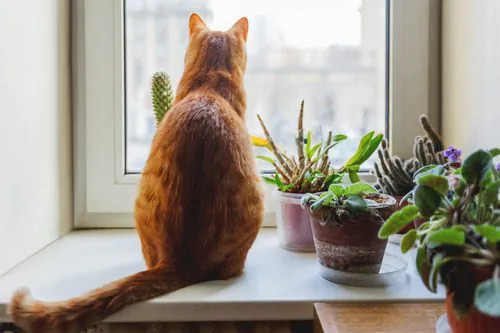Cats, with their inquisitive nature, often explore their surroundings, sometimes leading to them nibbling on houseplants. While this might seem like harmless curiosity, many common plants can be toxic to cats, posing serious health risks. It’s vital for cat owners to be informed about these dangers to create a safe environment for their beloved pets. One plant that often raises questions is Aloe Vera. Known for its soothing properties for humans, is aloe vera safe for cats, or Is Aloe Toxic To Cats? Let’s delve into the potential dangers of aloe vera for cats and what you need to know to protect your feline friend. If you are concerned that your cat has ingested any plant, please contact your veterinarian immediately or call Altadena Pet Hospital at (626) 798-0738 or book an appointment online.
 orange-cat-sitting-on-window-sill-next-to-house-plants
orange-cat-sitting-on-window-sill-next-to-house-plants
Is Aloe Vera Toxic to Cats?
Yes, aloe vera is toxic to cats. While often touted for its health benefits for humans, aloe vera contains compounds that are harmful to our feline companions. The toxicity in aloe vera for cats stems from substances found within the plant’s leaves, specifically saponins and anthraquinones. These compounds are present in the gel and, more concentrated, in the latex (the yellow sap found just under the skin of the leaf).
Toxic Components in Aloe Vera
- Saponins: These are glycosides that have foaming properties. When ingested by cats, saponins can cause gastrointestinal upset.
- Anthraquinones (specifically Aloin): These compounds are known for their laxative effects and are a significant contributor to aloe vera’s toxicity in cats. Aloin, in particular, is a bitter, yellow compound found in the latex of the aloe leaf and is a potent irritant to the feline digestive system.
Symptoms of Aloe Vera Poisoning in Cats
If your cat ingests aloe vera, they may exhibit a range of symptoms, varying in severity depending on the amount consumed and the individual cat’s sensitivity. Common signs of aloe vera poisoning in cats include:
- Vomiting: This is a frequent reaction as the cat’s body attempts to expel the toxic substances.
- Diarrhea: Anthraquinones act as a laxative, leading to diarrhea, which can cause dehydration.
- Lethargy: Your cat may become unusually tired and weak due to the toxic effects and gastrointestinal distress.
- Changes in Urine Color: Anthraquinones can alter urine color, making it appear reddish or brown.
- Tremors: In more severe cases, neurological symptoms like tremors can occur.
- Loss of Appetite: Due to nausea and discomfort, your cat may refuse to eat.
- Dehydration: Vomiting and diarrhea can quickly lead to dehydration, which is dangerous for cats.
If you observe any of these symptoms and suspect your cat has ingested aloe vera, it is crucial to seek veterinary attention immediately.
Why Cats Might Be Attracted to Aloe
Despite its toxicity, cats might be drawn to aloe vera plants out of curiosity or due to the plant’s texture. Cats explore their environment through taste and smell, and a dangling aloe leaf might simply be tempting for a playful nibble. It’s not necessarily because they are attracted to the taste, but rather the novelty of the plant.
What to Do If Your Cat Eats Aloe
If you know or suspect your cat has eaten aloe vera, prompt action is essential:
- Remove Access: Immediately move the aloe vera plant out of your cat’s reach.
- Observe Symptoms: Monitor your cat closely for any of the symptoms mentioned above.
- Contact Your Veterinarian: Call your vet or Altadena Pet Hospital immediately. Do not wait for symptoms to worsen.
- Provide Information: Be ready to tell your vet:
- How much aloe you think your cat ingested.
- When you think they ingested it.
- What symptoms you are observing.
- Follow Vet’s Advice: Your veterinarian will advise on the best course of action, which may include bringing your cat in for examination and treatment. Treatment may involve inducing vomiting, administering activated charcoal to absorb toxins, and providing supportive care like intravenous fluids to combat dehydration.
Safe Alternatives to Aloe Vera in Your Home
If you are a plant lover but also a cat owner, you don’t have to forgo greenery altogether. There are many beautiful, cat-safe plants you can choose to decorate your home. Some excellent alternatives to aloe vera include:
- Spider Plants (Chlorophytum comosum): These are easy to care for and air-purifying, making them a great choice for any home.
- Cat Grass (Various grasses like wheatgrass, oat grass, barley grass): Specifically grown for pets, cat grass is safe and even beneficial for cats to nibble on, aiding in digestion and hairball control.
- Boston Ferns (Nephrolepis exaltata): These lush ferns are non-toxic to cats and add a touch of green elegance to your space.
- Prayer Plants (Maranta leuconeura): Known for their striking leaf patterns and non-toxic nature, prayer plants are a visually appealing and safe option.
By choosing pet-friendly plants, you can create a beautiful and safe environment for both you and your feline companion.
Other Plants Toxic to Cats: A Brief Overview
While we’ve focused on aloe vera and the question of “is aloe toxic to cats?”, it’s important to remember that many other common plants can be harmful to cats. Being aware of these can further protect your pet. Some other plants mentioned in the original article that are toxic to cats include:
- Lilies: Extremely toxic, especially to the kidneys. Even pollen is dangerous.
- Sago Palm: Highly toxic, particularly the seeds, causing liver damage.
- Dieffenbachia (Dumb Cane): Causes oral irritation and swelling.
- Oleander: Highly toxic, affecting the heart.
- Pothos (Devil’s Ivy): Causes oral irritation and gastrointestinal upset.
- Azaleas: Toxic, affecting the gastrointestinal and nervous systems, potentially leading to coma.
- Chrysanthemums (Mums): Cause gastrointestinal upset and incoordination.
 orange-cat-sitting-on-window-sill-next-to-house-plants
orange-cat-sitting-on-window-sill-next-to-house-plants
Protecting Your Cat from Plant Poisoning
Creating a safe home for your cat means being proactive about potential hazards, including toxic plants. Always research plants before bringing them into your home or garden to ensure they are safe for pets. If you are unsure about a plant’s toxicity, it is always best to err on the side of caution and keep it away from your cat.
In conclusion, aloe vera is indeed toxic to cats and should be kept out of their reach. By being informed and choosing cat-safe plants, you can enjoy a beautiful, green home without compromising the health and safety of your feline family member. If you ever suspect your cat has ingested a toxic plant, remember to contact your veterinarian or Altadena Pet Hospital at (626) 798-0738 or book an appointment online immediately. Prompt action can make all the difference in ensuring your cat’s well-being.

